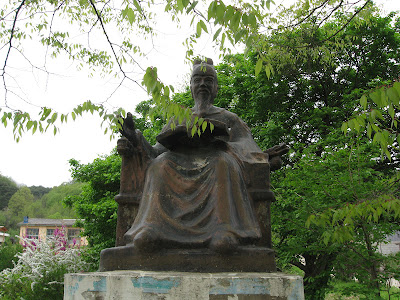Thursday, May 24th: by 7:30am I was already on a bus to the coastal city of Pohang. From there myself and a group of other teachers selected for the annual Dokdo trip boarded a boat bound for the island of Ulleungo in the East Sea (Sea of Japan). The purpose of the trip, organized by the Gyeonsangbuk-do Provincial Office of Education (POE), was somewhat twofold. For one, it was an opportunity to present lectures and promote discussion on the history and issues of international law involving the twin islets (dongdo and seodo) known jointly as Dokdo, and it was a series of photo-ops to document this large presence of foreigners learning about the issue and setting foot on the island (or at least the concrete dock we were limited to). Case in point, I was interviewed by a TV crew about my thoughts on the island a few moments after disembarking from the ferry.
In brief, the issue surrounding Dokdo is that both Korea and Japan have both long laid claim to it, still without resolution (it sits in the ocean 87.4 km southeast of Ulleungdo and 157.5km northwest of Japan's Oki island, off the coast of Shimane prefecture). To this end Korea has built some facilities to house and support a fisherman and his wife, as well as about a dozen or so police officers stationed on the island. South Korea is desperate to raise international awareness of the issue, as it has been largely ignored outside of the country and certain groups within the Japanese government, which is the main reason efforts are undertaken each year to bring teachers currently serving with EPIK to Ulleungdo and Dokdo. In terms of a legal battle, Korea is not confident in going with Japan to trial in international courts over the dispute because they (apparently) feel that Japan, as a larger and more powerful country, will hold more sway in such an arena. The risk of losing Dokdo is absolutely unacceptable to most Koreans.



